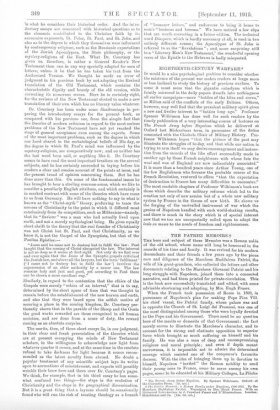EIGHTEENTH-CENTURY WARFARE.*
IT would be a nice psychological problem to consider whether the existence of the present war makes readers at large more or less inclined to study the history of previous warfare. To some it must seem that the gigantic cataclysm which is faintly mirrored in the daily papers dwarfs into nothingness all earlier campaigns—mere "battles of the kites and crows," as Milton said of the conflicts of the early Britons. Others, however, may well find that the prevalent military spirit gives a new and livelier interest to " battles long ago." Professor Spenser Wilkinson has done well for such readers by the timely publication of a very interesting course of lectures on The French Army before Napoleon which he delivered at Oxford last Michaelmas term, in pursuance of the duties connected with the (Michele Chair of Military History. Pro- fessor Wilkinson hopes "that the picture of the past may illustrate the struggles of to-day, and that while our nation is trying to arm itself we may derive encouragement and instruc- tion from the records of the like effort successfully made in another age by those French neighbours with whose fate the weal and woe of England are now indissolubly associated." It is more than a hundred years since Arthur Young, one of the few Englishmen who foresaw the probable course of the French Revolution, ventured to affirm " that the expectation of destruction to France has many difficulties to encounter." The most readable chapters of Professor Wilkinson's book are those which describe the military reforms which led to the creation not only of new armies but of a whole new military system by France in the throes of new birth. He shows us the forging of the unrivalled instrument of war which the genius of Napoleon handled with such world-shaking results, and there is much in the story which is of special interest now that we too are unexpectedly called upon to adapt the levee en masse to the needs of freedom and righteousness.


































 Previous page
Previous page